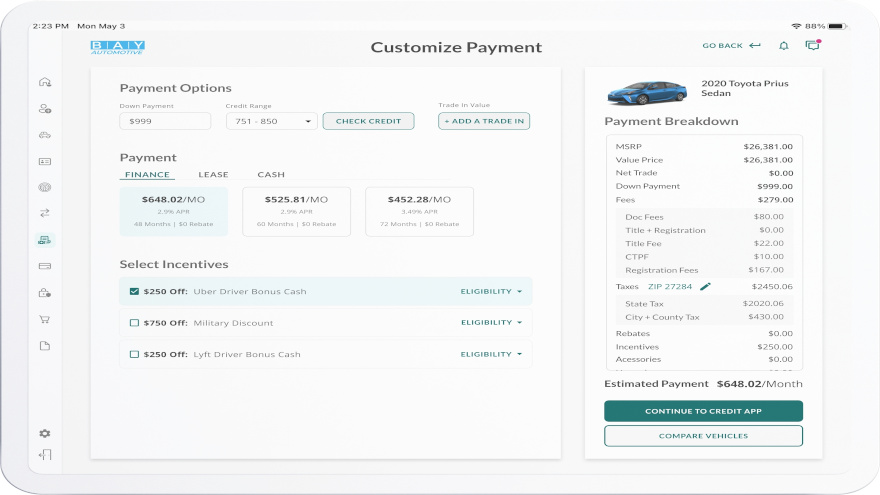InformedIQ CEO Justin Wickett described the ongoing development of artificial intelligence (AI) and machine learning (ML) within the automotive space for this episode of the Auto Remarketing Podcast recorded in Dallas during the Vehicle Finance Conference hosted by the American Financial Services Association.
Wickett also touched on how automotive has set the foundation for the company to explore other parts of the credit market.
To listen to the conversation, click on the link available below.
Download and subscribe to the Auto Remarketing Podcast on iTunes.
Open Invention Network (OIN), the organization formed to safeguard open-source software (OSS), announced on Wednesday that The Clearing House (TCH) has joined as a community member.
As the nation’s most experienced payments company, operating U.S.-based payments networks that clear and settle more than $2 trillion each day through wire, ACH, check image and real-time payments, officials said TCH is reinforcing its commitment to OSS as an enabler of advanced financial services payment platforms.
“Advancements in financial services and fintech increasingly rely on open-source technologies,” said Keith Bergelt, CEO of Open Invention Network. “As the most experienced payment company in the U.S., and a keystone for the financial services industry, we are pleased that The Clearing House is committed to patent non-aggression in core Linux and adjacent open source technologies.”
Sean Reilly, senior vice president and associate general counsel at The Clearing House, said, “We remain focused on integrating the best technologies in our payment networks, which help to deliver services that our banks’ customers value and trust. We enable all financial institutions to offer safer, faster, and smarter digital transaction services, and open source is a significant innovation driver in these offerings.
“We are pleased to join the Open Invention Network and support its role in protecting open source software,” Reilly went on to say.
OIN reiterated that its community practices patent non-aggression in core Linux and adjacent open source technologies by cross-licensing Linux System patents to one another on a royalty-free basis.
Patents owned by Open Invention Network are similarly licensed royalty-free to any organization that agrees not to assert its patents against the Linux System.
The OIN license can be signed online at http://www.j-oin.net/.
According to a new report published by UnivDatos Markets Insights, artificial intelligence in the fintech market is expected to grow at a compound annual growth rate (CAGR) of around 30% from 2022 through 2028.
UnivDatos Markets Insights highlighted that its report has been aggregated by collecting informative data on various dynamics such as market drivers, restraints, and opportunities. This innovative report makes use of several analyses to get a closer outlook on the AI in fintech market.
The AI in fintech market report offers a detailed analysis of the latest industry developments and trending factors in the market that are influencing the market growth. Furthermore, this statistical market research repository examines and estimates the AI in fintech market at the global and regional levels.
UnivDatos Markets Insights explained artificial Intelligence in the fintech market is part of the data collection, analysis of the data, facilitating and securing transactions, providing customer-centric modules and streamlining the process. Also, it can provide better analytics, stronger security, virtual assistance, chatbot and insight.
“AI in fintech allows fintech organizations to predict customer behavior by collecting their behavioral data. In recent times, AI in the fintech organization has witnessed a significant demand for AI technology in the fintech institution owing to the lower time consumption for the query and easier processing for monetary uses,” UnivDatos Markets Insights said in a news release.
“Moreover, the COVID pandemic has changed the behavioral structure of both institutional organizations and customers and allows the organization to implement faster as well as more convenient processes and propel the incorporation of AI in the fintech sector,” the firm continued.
Due to travel limitations and the projected dismal financial performance of market players in 2020, UnivDatos Markets Insights acknowledged the spread of the COVID-19 pandemic has hurt the AI in fintech industry.
Supply chain execution, regulatory and policy changes, labor reliance, working capital management and liquidity and solvency management are all major concerns for AI in fintech service providers, according to the firm.
“Since the COVID-19 epidemic has considerably diminished by the beginning of 2021, a lot of businesses are resuming operations. In addition, the pandemic has put a hold on investment and research and development activities and negatively impacted the market,” experts said.
While compiling the global AI in fintech market report, researchers thoroughly studied several aspects that would help stakeholders in making their decisions more curated, including
—Based on type, service and solution
The solution segment has a significant CAGR during the forecast period and is expected to remain the same during the forecast period owing to the adoption of AI and machine learning (ML) in the field of banking and financial institution services to manage big data and to generate significant insight from the collected data.
UnivDatos Markets Insights said the companies in the market are focusing on innovative and lucrative products and solutions for the user to increase the adoption of AI-enabled technology among the users.
—Based on the deployment
UnivDatos Markets Insights pointed out the market is categorized into on-premises and cloud segments.
Experts said the on-premises segment has shown significant market growth for the year 2021 and is expected to remain the same during the forecast period owing to the enhanced security feature, greater flexibility for data management, and provide better usability for the organization.
Also, UnivDatos Markets Insights noted the on-premises deployment offers a reduction in the total operational cost and offers better security for the data as no third party is involved in the data collection, data analysis and data management.
—Based on application
UnivDatos Markets Insights went on to note that the AI in fintech market has been classified into chatbots, customer behavioral analytics, business analytics and reporting and others.
Experts said the chatbots segment produced significant market growth in the year 2021 and are expected to remain the same during the forecast period owing to the ability to resolve the queries in a fraction of the time and the availability of the on-demand feature.
The chatbots use automated scripts to resolve the queries on their own, according to UnivDatos Markets Insights.
The report can be acquired by going to this website.
Just before Labor Day weekend, Bridgecrest, one of the country’s leading digital financial services providers, announced the launch of its newest affiliate, GoFi, an artificial intelligence-enabled, digital-first financing platform.
Leveraging Bridgecrest’s robust auto financing experience, GoFi is focused on offering its innovative white-label and co-branded auto finance solutions to banks, finance companies and other partners, with the goal of meaningfully expanding partners’ existing buy box to allow them to serve more customers.
“We are incredibly excited to build on our history of creating innovative lending solutions with the launch of GoFi,” Bridgecrest chief executive officer Mary Leigh Phillips said in a news release. “Providing a great customer experience while expanding access to credit enables our partners to increase sales, improve unit economics, and better engage and serve customers long-term.”
Built on a proprietary loan origination system and powered by its integrated machine learning algorithms, GoFi can provide auto-decisioned responses across the full credit spectrum. Through simple, intuitive offers, GoFi aims to help partners expand their brand impact and deliver a better customer experience.
GoFi head of lending Karl Stabler explained that GoFi’s program comes to market at a time when finance companies and other market participants are embracing the challenges associated with adapting to a quickly evolving auto landscape.
“Our flexible, fully automated next gen lending platform provides easy integrations to help increase conversion and enhance the lifetime customer relationship for our partners,” Stabler said.
LendBuzz co-founder and chief executive officer Amitay Kalmar described the characteristics of artificial intelligence, machine learning and algorithms that intrigue him most during this episode of the Auto Remarketing Podcast.
Then Kalmar explained what those elements now can do for the benefit of underwriting and more within auto finance.
To listen to the conversation, click on the link available below, or visit the Auto Remarketing Podcast page.
Download and subscribe to the Auto Remarketing Podcast on iTunes or on Google Play.
Origence is amid a string of records associated with auto financing and credit unions, and it appears the company wants to remain on that path through leveraging a partnership with Informed.IQ, a provider of artificial intelligence-based software to financial institutions
According to an announcement made last week, Informed.IQ will power Origence’s document process automation functionality for indirect financing to automatically identify documents and validate financing policies in an effort to create a better credit union and dealer experience.
Through accurate consumer income calculations and validation of applicant data, contract documents, and documented classification and stacking, Origence and Informed.IQ see paper being processed faster and more accurately, with reduced human errors and fraud risk, as well as added operational efficiency.
Informed.IQ explained that its artificial intelligence modeling engine can perform complex calculations, ensuring accuracy, identifying omissions and combating fraud. With a 99% accuracy rate, Informed.IQ said dealers and credit unions can now focus less on collecting and validating data and more on developing strong customer relationships.
“Partnering with Informed.IQ to integrate their leading AI-based technology allows us to advance our lending systems’ capabilities and performance, further streamlining the overall loan process for our credit unions and their members,” Origence chief product officer Brian Hendricks said in a news release.
In 2021, Origence helped credit unions fund $58 billion in contracts and more than $390 billion since the company’s inception. A total of 1,130 credit unions serving more than 64 million members nationwide funded a record 1.3 million contracts through the Origence’s financing platforms during the second quarter.
Through Origence’s network of more than 15,000 dealers, Informed.IQ said its technology will complement Origence’s technology to provide credit unions a way to streamline indirect processing, enabling faster funding, as well as provide dealers with a fast, convenient way to upload missing documents.
“We’re making it easier for credit unions to process auto loans,” Informed.IQ chief executive officer Justin Wickett said. “Utilizing machine learning and accurate data to streamline the decision-making process enhances Origence’s end-to-end solution and their ability to improve staff efficiency, expedite their loan process, and enhance the member experience.”
Credit unions interested in learning more about this new indirect financing capability can contact Origence at (833) 908-0121
Fitch Ratings acknowledged that artificial intelligence and machine learning are increasingly deployed in credit and risk functions at financial institutions, enabled by greater data availability and affordable computing capacity
While AI and ML can improve operational efficiency and analytical outcomes, Fitch pointed out that using those tools carries risks of “black box” decision-making and data, as well as programming deficiencies and biases
Fitch elaborated about the potential risk through a report titled, “What Investors Want to Know: Artificial Intelligence and Financial Institutions,” and added that regulation and internal governance can help reduce these risks.
“Financial institutions use AI-based systems and ML to improve predictive models in operational risk management, including fraud detection, stress testing and provisioning, as well as credit assessment applications, such as credit scoring for loan underwriting and monitoring the performance of existing assets,” Fitch said in a news release.
“Regulatory reforms are being undertaken to address AI reliability and transparency issues. Underwriting criteria produced by AI models may be opaque, making it difficult to understand which factors drive the decision-making process. This also makes it difficult to compare AI model results with historical data in our analysis of structured finance transactions,” the firm continued.
Fitch also explained that the use of AI and ML can make data analysis and credit risk assessment more efficient since the tools can allows large quantities of data to be analyzed quickly and may lead to the discovery of new risk segments or patterns by filtering through variables for significant predictors.
Firm experts also said that AI and ML can expand credit availability for consumer whom creditworthiness can be measured using nontraditional metrics.
“Smaller lenders are more likely to use AI to make credit decisions, perhaps to gain an edge over competitors, and are helped by access to cloud-based lending management systems,” Fitch said.
“The quality and volume of data used to train AI/ML systems directly affects the predictive accuracy of most AI models,” Fitch went on to say. “Faulty or limited data and programmer biases can lead to erroneous AI/ML outcomes, resulting in poor origination quality, loosening underwriting practices or discriminatory credit decisions, with potential reputational and financial repercussions.”
The entire report can be found via this website.
CDK Global recently pinpointed the impact artificial intelligence (AI) is having on dealerships.
According to a study by the retail technology company, approximately 68% of dealerships believe adoption of AI has had a positive impact on their businesses, stemming from an increasing amount of data created by dealers, manufacturers and vehicles.
AI technologies can provide significant and measurable benefits across other industries.
In a separate survey by McKinsey & Company, 63% of respondents reported revenue increases due to the use of AI applications with average gains of around 10%.
Within automotive retail, CDK Global said AI can be used to solve some of today’s biggest dealer challenges, including:
— Addressing employee and skills shortages by replacing resource-intensive tasks and augmenting employee skills
— Attracting customers by looking at existing sales and service profiles and determining their propensity to buy
— Retaining existing service customers through proactive and personalized service and by better predicting potential vehicle issues.
CDK’s Artificial Intelligence in Automotive Retail Report highlighted the use of AI tools in automotive retail and the optimism for the benefits it will provide dealerships in the future. Some of the major findings included:
— Dealers are familiar with artificial intelligence (75%), with 40% feeling extremely or very familiar with the topic.
— Dealerships are already using AI or plan to do so within the next three to five years (68%).
— Dealers who don’t use AI today, but plan to in the future, anticipate positive outcomes (56%).
— Only 2% of the respondents said that they didn’t see their dealership using AI-based applications in the future.
CDK Global chief product and technology officer Mahesh Shah highlighted that automotive retail is investing in AI and is already seeing the benefits.
Whether a dealership is currently using AI or plan to, Shah pointed out that nearly all the respondents believe AI will be an integral part of dealership operations.
“Today’s world is undoubtedly data driven, and every transaction that happens between the dealers, manufacturers and consumers is an essential data source that can be used to build more simple and convenient buying and ownership experiences,” Shah said in a news release. “For this to happen, we must come together as an industry to exchange data in a fast, reliable and secure way through platforms that are built on modern, cloud-based architectures.
“The results of our research are encouraging and tell us dealers are excited about the possibilities of AI and how it will help them meet their financial and customer satisfaction goals,” Shah went on to say.
The CDK Global Artificial Intelligence in Automotive Retail Report was conducted in October among a national sample of 243 dealership department heads and executives.
The interviews were conducted online by CDK Research & Insights across a representative mix of roles, location, departments and sales volume.
To view the full report, go to this website.
Upstart ventured into auto financing last summer and then acquired Prodigy in April to enhance its platform fueled by artificial intelligence.
Then last week, the company announced the availability of Upstart Auto Retail software, which includes AI-enabled financing.
Upstart explained the cloud-based solution can offer a “superior” vehicle-buying experience for both consumers and dealerships because this new software will provide access to Upstart-powered auto financing for the first time.
Upstart Auto Retail is the evolution of Prodigy Software, which was acquired by Upstart in April. So far this year, Upstart said in a news release, the number of dealerships signed up to use its software has nearly tripled.
One of those users is Del Grande Dealer Group (DGDG), one of the largest family-owned dealer groups in the San Francisco Bay Area. According to that news release, DGDG has used Upstart’s tools for more than a year.
“The auto selling solution we’ve been using from Upstart has empowered our salespeople to make the buying process more transparent and helped sell more vehicles at a higher profit,” DGDG vice president of finance Tony Corini said. “Now by adding Upstart-powered financing, we look forward to approving more borrowers and continuing to develop our No Brainer checkout experience.”
With the addition of Upstart-powered financing, Upstart said more dealerships will be able to instantly offer affordable financing to more of their customers.
While Upstart said it is currently rolling out AI-powered financing to a limited number of dealers, the company pointed out that it will be available early next year to all dealers using the platform.
“Buying a car is an iconic and memorable experience for most Americans, but the financing step is where things often unravel,” Upstart chief executive officer and co-founder Dave Girouard said. “Upstart Auto Retail will provide millions of consumers with a car buying experience worthy of 2021, including that all-important financing step.”
Drive Appeal, an independent dealership group with five rooftops in Minnesota, is turning to artificial intelligence to boost its underwriting and enhance vehicle deliveries.
According to a news release, Drive Appeal (formerly AC Motors), recently selected AI-powered platform Scienaptic AI to be able to offer financing to more customers.
“Scienaptic's AI-powered platform is a fantastic fit for the AI roadmap we have in mind,” Drive Appeal president John Prosser said in the news release. “Using Scienaptic’s AI, we will be able to make better lending decisions for every single customer. This will make vehicle financing easier, and more customers will be able to own their dream car.”
Scienaptic said its mission to increase credit availability by transforming technology used in credit decisioning by dealerships as well as banks, credit unions and other fintech firms.
“We are pleased to partner with Drive Appeal in their endeavor to enable a more streamlined, efficient loan decisioning process,” said Pankaj Jain, president of Scienaptic. “Scienaptic’s powerful, adaptive AI will equip them to create more approvals faster, strengthen customer relationships and drive an unparalleled experience.”












